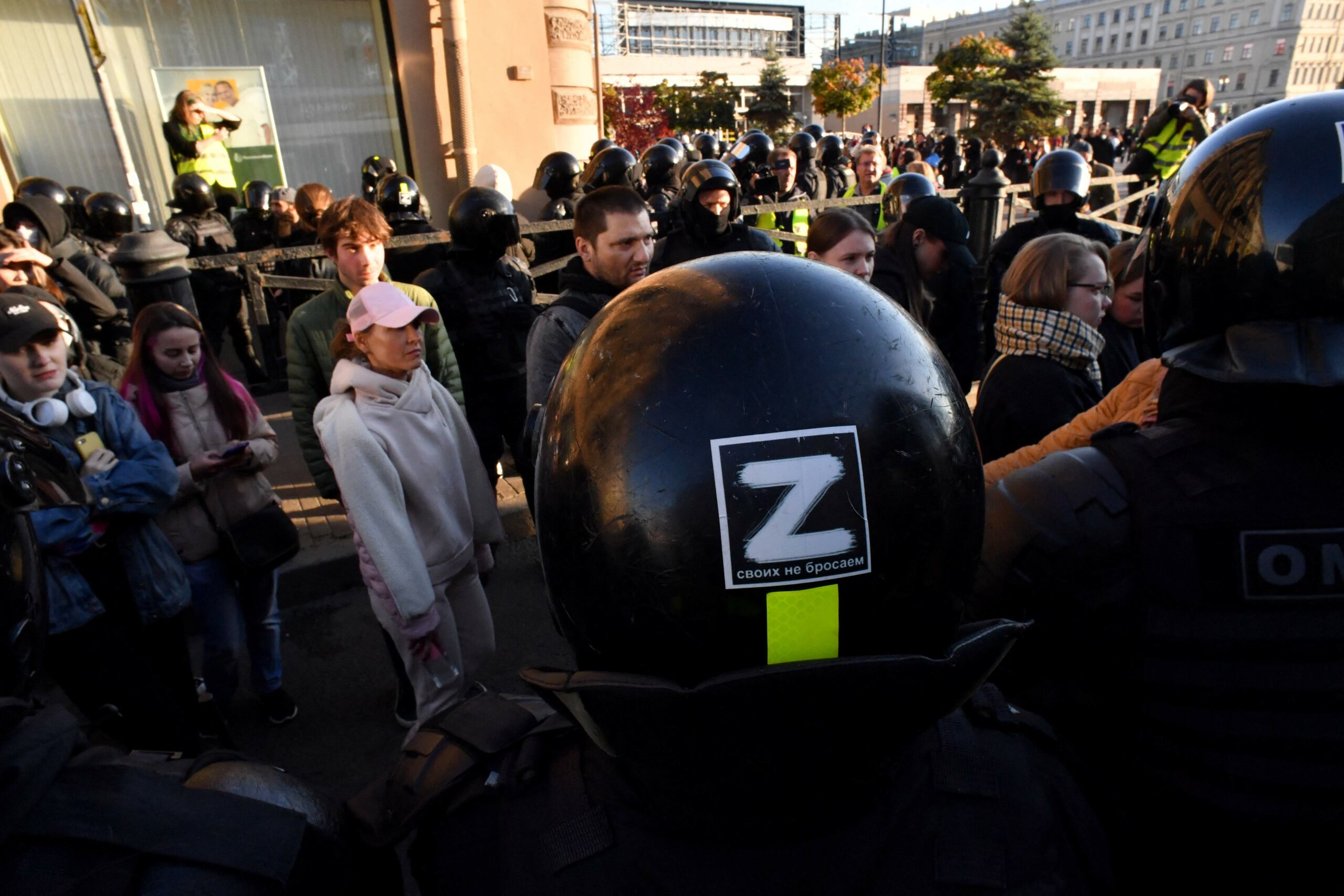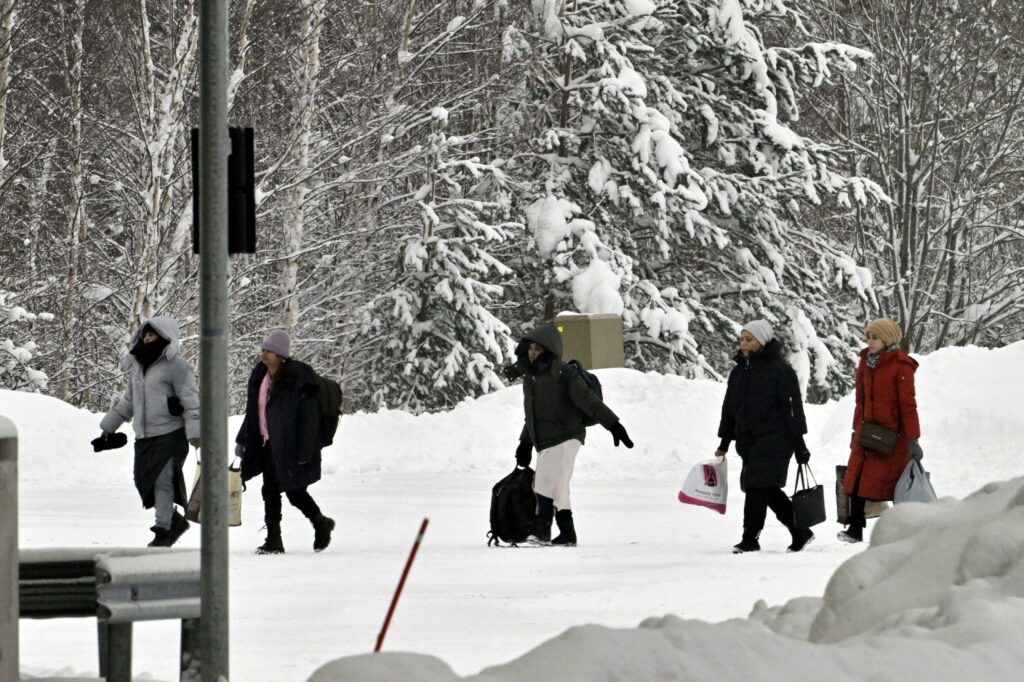In late March last year, a Russian online lifestyle magazine, The Village, published an article about people who had emigrated since the government’s full-scale invasion of Ukraine. A quote of one woman made the headline: «After our departure, Russia will become a scorched earth populated with Putinists.» These words scratch at a sore point between Russian dissidents who left and those who stayed. A team of independent sociologists conducted a study based on some 30 in-depth interviews with activists from Russia to find out whether there remains an Russian anti-war movement to speak of within the country’s borders and whether anyone now besides the proverbial «Putinists» reside in the country.
In the Climate of Repression
Contrary to the classic assumption that there is no protest activity in Russia, by April 2023 the human rights project OVD-Info had recorded more than 10,000 arrests for an anti-war stance, more than 6,000 cases initiated following the passing of the new «fakes law» that criminalizes «spreading fakes about the Russian army» and 500 criminal cases under 107 other articles of the Criminal Code of the Russian Federation. Many NGOs and research groups were declared «foreign agents»: they are banned from carrying out awareness-raising campaigns and educational activities for minors, Nor are they allowed to organize public events or transfer money to their organizers. According to the law, «foreign agents» are required to submit quarterly reports on all receipts and expenditures and to mark each performance in the media with a disclosure that their content is produced by a «foreign agent.» Errors and mishaps in reporting or labeling can lead to administrative cases, and any repeated violations can bring criminal charges
More than 70 foreign and international organizations working with Russia are branded «undesirable», and any cooperation with them can lead to administrative prosecution, while participation in the activities of such organizations entails criminal prosecution. Besides Western foundations and NGOs, Russian law-enforcers have also included some independent media outlets in the list of undesirable organizations: reposting or commenting on their materials, appearing for iinterviews or just offering comments can be regarded as participation in the activities of an undesirable organization and entails punishment. Riddle is on that list, too.
Authorities brand «extremist» any organizations seeking to participate in politics. Along with radical religious and far-right groups, the list of extremists includes, for example, Navalny-affiliated organizations and the Youth Democratic Movement Vesna. Displaying symbols of these organizations is fraught with administrative penalties, and employees or members of an «extremist movement» face up to six years in prison.
Finally, any unwanted organization can simply be liquidated by court order, as was the case with Memorial Society or the Moscow Helsinki Group. Yet in spite of all the risks associated with anti-war activities, there has been a surge in civic engagement among Russians inside and outside Russia. New humanitarian, human rights, media, and partisan projects have sprung up, and longstanding NGOs have reorganized their work along anti-war lines or added an anti-war agenda to their regular activities.
Humanitarian as Anti-war
The very notion of «anti-war» intuitively suggests we are talking about an action or statement aimed at ending the war. This interpretation is logical, but it does not fit the Russian context. Many activists, and also the sociologists who conducted the study, speak of «anti-war» as a broad concept that encompasses different forms of civic initiatives that deal with the humanitarian and political consequences of Russia’s military invasion of Ukraine. At the same time, individual participants in some initiatives — for instance, those working with Ukrainian nationals who were forced to stay on Russian territory — may not demonstrate a clear anti-war stance or may even implicitly support the actions of the Russian Federation.
Although the public image of these humanitarian initiatives may not correspond to Western or Ukrainian perceptions of an anti-war stance, the people who spearheaded these projects do not bring to the fore the attitudes of individual participants, but rather the overall vector of their initiatives: helping those affected by the war cope with its fallout. Exaggerated politicization can provoke reprisals against humanitarian activists, making it impossible to offer help Ukrainians trapped in Russia. An activist of one such project in Saint Petersburg explains: «I think that by taking a lot of people out of here [he means deported Ukrainians and refugees traveling through Russia to Europe], we help relieve a lot of social tension. In general, the Russian state mostly does not obstract out actions. Therefore, this is a useful activity, as long as it is not politicized — it does not bother anyone.» Another activist who helps Ukrainians leave Russia acknowledges the importance of her work, but does not consider it to be an example of anti-war activity: «We do make a contribution. It’s cool. What we’re doing is important. But it does not stop the war, it does not change the regime.»
In Russia and Abroad
When selecting initiatives to include in their study, the team of sociologists did not know where the participants were located. During the interviews, it became clear that most initiatives worked from abroad; but in many cases the initiative had been developed by teams located on both sides of the border. It stands to reason that the participants of those initiatives that solve problems requiring their physical presence in the country are based in Russia. For example, an initiative that helps Ukrainian citizens leave Russia implies that its participants collect and deliver personal effects (clothes, toiletries, etc.) to Ukrainians, transport them from one locality to another, assist with completing necessary paperwork, accompany them to bureaucratic offices, and offer overnight accommodations in their own apartments. All of this is impossible to do without physically being in Russia. At the same time, the initiative depends in part on contacts with those abroad, since the routes of these escapees also pass through European territory.
Direct action activists, meanwhile, carry out sabotage related to the disruption of supply lines to the Russian army, which means their work is directly aimed at infrastructure located on Russian territory. Street art and agitation require direct work within the urban environment of Russia. Human rights organizations also cannot operate without relying on their physical presence in the country: they involve legal experts who visit political prisoners in penitentiaries or represent their interests in courts. At the same time, coordinators or volunteers of the initiative might be based abroad. Media projects, counselling and mental health projects, political outreach initiatives, shelters, and initiatives advising on a wide range of issues may operate entirely remotely by Russians who have left, but most require an assistant in Russia at one time or another. In such cases, initiatives face the dilemma of how to accomplish tasks that require physical presence in Russia without compromisin or endangering the safety of participants. Teams devise safety protocols and follow them, but no one can guarantee the safety of an anti-war activist who remains in Russia today.
Campaigning and Aid
Besides humanitarian initiatives, the Russian anti-war movement encompasses projects working directly or indirectly to end the war by whatever means available to activists. They agitate Russians to fight [against the regime or the war] and expand the number of similar-minded people by creating materials and risk reduction strategies for protestors. Elsewhere, guerilla movements sabotage military and transportation facilities, disabling or damaging infrastructure that directly supports military operations. Human rights initiatives provide legal assistance to Russians subjected to political repression for displaying an anti-war stance. They help people leave military service, avoid conscription, inform them about the options of alternative civilian service and offer legal assitance to support the right not to take part in the war. With the adoption of the law on «electronic draft notices» and the limitation of the rights of conscripts if they fail to appear at the military registration office, there is no question that the work of human rights defenders in this field will become even more sought-after. A separate legal area is the protection of the rights of minorities; with the war, Russia is now tightening legislation against minorities. Transgender people and members of the LGBTQ+ community have become the embodiment of the «collective West,» against which Russia is waging a war meant to help it defend and preserve «traditional values» allegedely jeopardized in the West.
Media outlets, both long-established and those that only appeared after February 24, 2022, produce analysis and reporting; they resist censorship; they expose fakes; and they raise public awareness of war crimes, repressions and other consequences of Russia’s war against Ukraine. They also tell their audiences about the various ways in which they could demonstrate their anti-war stance. Initiatives aimed at countering Russian propaganda expand the networks of those trying to stop the war through personal messages, phone calls, and comments on social media. Some initiatives draw professional psychotherapists to counsel those who seek help, while others bring together artistic groups and create platforms for anti-war statements articulated in the language of art.
Many projects combine different spheres of activity and provide comprehensive support to Ukrainian refugees and deportees, as well as to different groups of Russians: professional, ethnic, and territorial, without neglecting campaigning work aimed at anti-war coalition building. For example, one survey respondent recounted that a certain anti-war project decided to launch a project of psychological support to boost the number of subscribers to its channel and conduct anti-war agitation more effectively.
Almost all anti-war initiatives with any public profile seek to change the political attitudes of Russians and show the public there is a community of like-minded people. The audiences of such initiatives receive information, analytics, and tools to participate in the agitation work. On the one hand, their task is to prepare people for collective action. As one respondent noted, they seek «to bring people together, to give them hope, to let them know that they are not alone, to forge a kind of community ready for some kind of action, incidentally, some kind of unified action.» On the other hand, such initiatives work to devise a toolkit for individual action, turning their followers into active supporters. As another respondent said: «We dedicate our social media accounts to those who are looking for answers to the question of „what is to be done“. We offer answers to those questions. At the same time, we offer people certain activities that are directed outside of that circle. It’s very important that people get involved in the agitation, that they put up flyers so that people who we do not reach directly through social networks, get informed.»
The political position of participants is vital for campaign initiatives. They work with existing supporters («people who are already interested and already on our side») and engage them to attract new like-minded people. Humanitarian initiatives, on the other hand, avoid political positioning in order to be able to help those in need.
Initiatives that set «campaigning» goals for hard-to-reach audiences of «doubters» or «fence sitters» are of particular interest here. One respondent tells us that the public image of her initiative does not correspond to the ideas shared by the initiators because their goal is to engage soldier mothers, and the activists need to speak to them in their own idiom without resorting to unfamiliar terminology or politicization, while building an anti-war stance in their minds. «We are well aware that our rhetoric is not for the democratic community, not for those who have already been involved in some protests or understand all too well the essence of what is going on. We talk in a very ‘goofy’ language that is sometimes mocked by all sorts of other initiatives who work with similar groups. We don’t care, we have a different objective».
Autonomy over Cooperation
The anti-war initiatives in the research sample do not carry out «pure» anti-war work; they almost always embed it within different contexts. As a result, anti-war work acts as a goal; the tools used to achieve it are politicized and linked to the background of the initiative’s participants. On the other hand, it functions as a tool in and of itself that can help achieve collective political goals. In the first instance, the political attitudes of the founders and participants of anti-war initiatives influence the methods used in their practices. Initiatives that stemmed from political associations (such as Navalny’s former regional offices) employed the familiar tools of street politics, gathering rallies and organizing pickets in the first weeks of the invasion. On the left side of the spectrum, we find initiatives drawing on the experience of trade unions that sought to organize strikes and sabotage production processes, and also anarchist associations that staged acts of wrecking and sabotage, while feminist groups mobilized their audiences with female empowerment rhetoric and promoting a narrative about the danger of normalizing violence.
In the second instance, antiwar activism appears to be a tool for achieving broader political goals. For some, the goal is the «reorganization of social life in the Russian Federation according to the ideals of anarcho-communism». In this scheme of things, opposition to the war «is both a method of reorganization, and part of this reorganization, since wars will become obsolete in an anarchic society. Stopping the war means hastening this moment.» For others, stopping the war hastens a very different kind of future when «a great nation comes together unified and builds a new beautiful libertarian country.» Others frame anti-war work in conjunction with a decolonial agenda: «The tactical [goal] we have now is to stop the war and mobilization. And the strategic goal is a strong, democratic, independent [name of national republic].» Ideological ruptures become an obstacle to unification. For example, national initiatives are very sensitive to the imperial rhetoric of other civil associations, and feminist initiatives are averse to any kind of xenophobia.
Nevertheless, most of the participants in the study say they are eager to engage in situational cooperation. They believe that the current situation means the current coalitions should learn from past errors of entrenched disunity, ushering in a new process that should be both voluntary and situational: «We decided not to try to squeeze everyone into a single organization,» highlighted one activist, «because people tried fighting. We realized that such democratic cooperation of different organizations among themselves is more productive when it operates on voluntary basis, because it does not require everyone to follow the same course of action.». Respondents most often see opportunities for solidarity in informing each other about their own activities, in training, and exchanging experiences.
However, many initiatives working in the same thematic field have a competitive relationship with each other, vying for resources and attention from overlapping audiences. Such is not the case with anti-war initiatives from the various national republics of the Russian Federation, which exercise their civic activism with talk of national self-determination and the fight against colonialism; in many cases they do offer a positive example of cooperation, mutual curiosity, and building dialogue. Such consolidation of initiatives has to do with shared experience and parallel goals; on the other hand, it has to do with working for different (national) audiences.
A Decolonial Future
Speaking of their vision of the future, participants of anti-war initiatives hope for an end to the war with the complete withdrawal of Russian troops from Ukrainian territory, the restoration of Ukraine’s territorial integrity, and Russia’s paying reparations to Ukraine. Only after these conditions are met will dialogue between the civil societies of Russia and Ukraine become possible again. At the same time, according to Russian anti-war initiatives, only representatives of Ukrainian civil society, but not of Russian civil society, have the right to initiate such a dialogue. While maintaining contacts with Ukrainians on personal and professional levels, Russian activists emphasize the need to receive an explicit permission to talk from the Ukrainian side when and if it deems such a dialogue possible. A notable exception are the initiatives that have emerged in the national republics and which, in addition to the anti-war struggle, aim at strengthening the subjectivity of national groups within the Russian Federation, including their secession from the federation. For them, their national identity and the colonial history of Russia are the basis for solidarity and interaction with Ukraine already today.










